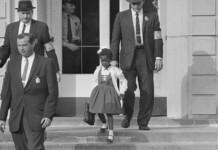50 years ago, Diamond Dogs was released on the label RCA by British pop-rock sensation David Bowie. A thematic, if not a concept album, Diamond Dogs was born as an attempt to adapt George Orwell’s Nineteen Eighty-Four to music. After being denied the rights by Orwell’s widow, Bowie devised an urban apocalyptic scenario based on the writings of William S. Burroughs. The album’s single, Rebel, Rebel reached number one in the UK and number five in the US, and remained a near-mainstay on his tour setlists well into the musician’s final years. READ more… (1974)

Not wanting Ziggy Stardust to define him, Bowie disbanded his backing band the Spiders from Mars and parted ways with producer Ken Scott in the run-up to the production of Diamond Dogs. While Bowie produced the album himself, Keith Harwood, who had worked extensively with the Rolling Stones and Led Zeppelin, was the recording engineer. Bowie also decided to handle lead guitar duties, for which he practiced every day.
Bowie’s biographer David Buckley wrote: “in the sort of move which would come to define his career, Bowie jumped the glam-rock ship just in time, before it drifted into a blank parody of itself.” Furthermore, the album is seen as a premonition of the punk revolution that was to grip Britain and the U.S. in the years to follow, with lyrical tales of skinny, undernourished young people taking drugs, running around with colored hair and knives.
MORE Good News on this Day:
- Mary Had a Little Lamb was published by Sarah Hale (1830)
- The New York Public Library opened (1911)
- The first film starring the Marx Brothers opened in theaters: The Cocoanuts (1929)
- Amy Johnson became the first woman to fly from England to Australia landing 19 days after leaving on the 11,000-mile flight (1930)
- First International Women’s Day for Disarmament (1981)
- Israeli troops left southern Lebanon after 22 years of occupation (2000)
- 15-year-old Sherpa Temba Tsheri became the youngest person to climb to the top of Mount Everest (2001)
- Russia and the United States signed the Moscow Treaty with both parties agreeing to limit their nuclear arsenal to 1700–2200 warheads each (2002)
64 years ago today, the first Eurovision Song Contest was held in Lugano, Switzerland. The ESC is the longest-running annual international televised music competition, and one of the world’s longest-running television programs besides. Annual audiences range wildly from 100 million to 600 million, and the event has come to be a defining event on European festival calendars, especially for young people eager to see the continent.

Typically it’s the nation that submitted the song that won who gets to host the following year’s contest. The nation will select a city, with 2023’s contest having just been held in Liverpool, UK.
Each participating broadcaster sends one original song of three minutes duration or less to be performed live by a singer or group of up to six people aged 16 or older. Each country awards 1–8, 10, and 12 points to their 10 favorite songs, based on the views of an assembled group of music professionals and the country’s viewing public, with the song receiving the most points declared the winner.
Many artists got their international launching point from the ESC, including Celine Dion and ABBA. (1956)
Happy 83rd Birthday to Bob Dylan, the Bard of our ‘(Forever) Young’ generation. Born Robert Zimmerman in Minnesota, Dylan renamed himself after the Welsh poet, Dylan Thomas.

The singer-songwriter-musician and visual artist, produced anthems for young Americans in the 1960s that chronicled the nation’s social unrest, like Blowin’ in the Wind and The Times They Are a-Changin’. After leaving his mark on folk music, Dylan “went electric” and revolutionized popular music in 1965 with his six-minute single Like a Rolling Stone—enshrined by a Rolling Stone magazine poll of music professionals as the #1 Greatest Song of All Time. He also won the 2016 Nobel Prize for Literature for his memoir, Chronicles: Volume One, which spent a year on the New York Times bestseller list.

What’s Bob been up to lately? Well, in honor of distilling his own brand of whiskey, Heaven’s Door, he put on his DJ hat in December to revive his “Theme Time Radio Hour”—back for the first time in over a decade—with a two-hour episode on the theme of whiskey. He also released his first album of original material in 8 years—Rough and Rowdy Ways, with 10 tracks including, Murder Most Foul, an epic poem about the JFK assassination. WATCH a fascinating video tribute… (1941)
Happy 64th Birthday to the English-French actress Kristin Scott Thomas. After making her film debut at 25 in Under the Cherry Moon, directed by Prince, she earned 5 BAFTA Award nominations—and won in 1994 after performing opposite Hugh Grant in Four Weddings and a Funeral.

On stage, she won the Olivier Award in the Royal Court revival of The Seagull—and was also nominated for an Oscar for The English Patient in 1996. Appointed as a Dame by Order of the British Empire, Scott Thomas’s film work includes Mission: Impossible, The Horse Whisperer, Gosford Park, and Tomb Raider, and won critical acclaim for I’ve Loved You So Long. Most recently, she earned an Emmy nomination for a guest role on Fleabag. WATCH that tremendous scene where she describes a woman’s life as ‘built-in pain’ but always leading to freedom… (1960)
And, on this day in 1968, The Rolling Stones released Jumpin’ Jack Flash. The single became their seventh No.1 hit in the UK, harkening back to their blues roots—their “funky, essential essence”—following several psychedelic LPs. Richards said he wrote the lyrics with Jagger while staying at his country house. They were awakened one morning by the sound of gardener Jack Dyer walking past the window. When Jagger asked what the noise was, Richards responded: “Oh, that’s Jack – that’s jumpin’ Jack.” WATCH an early Stones performance that might be the best version on video…




















[…] The Good News Network […]
[…] post Good News in History, May 24 appeared first on The Good News […]
[…] https://www.goodnewsnetwork.org/events060524/ […]
[…] post Good News in History, May 24 appeared first on Good News […]
[…] post Good News in History, May 24 appeared first on Good News […]